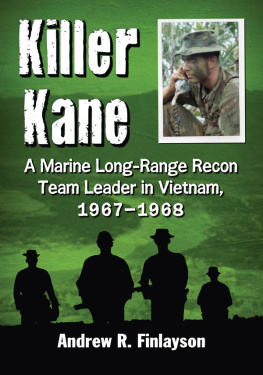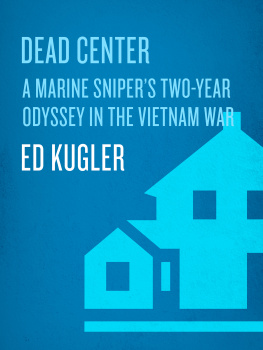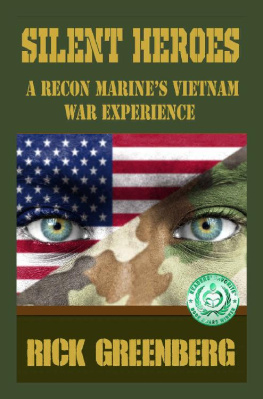
Killer Kane
A Marine Long-Range Recon Team Leader in Vietnam, 19671968
Andrew R. Finlayson

McFarland & Company, Inc., Publishers
Jefferson, North Carolina, and London
LIBRARY OF CONGRESS CATALOGUING DATA ARE AVAILABLE
BRITISH LIBRARY CATALOGUING DATA ARE AVAILABLE
e-ISBN: 978-1-4766-1214-0
2013 Andrew R. Finlayson. All rights reserved
No part of this book may be reproduced or transmitted in any form or by any means, electronic or mechanical, including photocopying or recording, or by any information storage and retrieval system, without permission in writing from the publisher.
On the cover: Andrew R. Finlayson calling in an artillery mission on a VC column; silhouettes of members of Killer Kane; background the Song Thu Bon River
McFarland & Company, Inc., Publishers
Box 611, Jefferson, North Carolina 28640
www.mcfarlandpub.com
To two extraordinary young men who gave their lives
for their country in South Vietnam. As long as I live,
I will remember them and honor their sacrice.
2nd Lt. Thomas Brown Dowd, USMC
Killed in Action in Quang Nam Province, 1 March 1967
Captain (Capt.) Eric M. Barnes, USMC
Killed in Action in Quang Nam Province, 25 March 1967
No one has greater love than this: to lay down his life for his friends.
John: 15:13
Qui procol hinc, qui ante diem perit: Sed miles, sed pro patria.
(He died far from home, and before his time:
But as a soldier and for his country.)
Grave stone inscription of a Roman legionnaire
Preface and Acknowledgments
I wrote this book to provide historians and the general reader with a rsthand account of how one twenty-three-year-old United States Marine ofcer fought his war. Many veterans of the Vietnam War have written about their experiences and the units they served in during that war. What differentiates my book is I wrote it from the perspective of someone with a far broader and lengthier exposure to the war. I spent 32 months in South Vietnam performing three distinct combat jobs in two different geographical areas during the most critical years of the war, 1967 to 1970.
I served in Vietnam both before and after the 1968 Tet offensive, and this changed my perspective on the war dramatically. I experienced the Search and Destroy attrition-intensive strategy that General (Gen.) Westmoreland employed prior to Tet, and then on my second tour I served during the period known as Vietnamization when the U.S. began its withdrawal from the war and turned over the ghting to the South Vietnamese. These were two very distinct periods and involved different strategies and tactics. This book covers only the preTet period and involves combat in only one geographical area of South Vietnam, an area approximately 25 miles west and south of the city of Da Nang. It covers the thirteen months leading up to the Tet offensive and does not cover any portion of my second tour of duty in South Vietnam, where my experiences were far more diverse and far more inuential on my perspective on the war. While it might be helpful for students of the war to understand how the transition from one phase of the war to another affected one junior ofcer ghting in that war, I have chosen to save that analysis for another time and another book.
The book is not a critique of the war. I offer no broad generalizations within. Instead, the book reects the feelings and observations of one young man as he fought his own personal war in the company of a small band of exceptional comrades. Although the events I describe occurred over 40 years ago, a span of time that allows for reection, I have tried to write this book from the perspective of my younger self, rather than from the perspective of someone who has spent many years since then studying the war and drawing conclusions on the broader events that transpired. Sometimes, however, these two perspectives converge in order to offer a point of helpful comparison. I have tried to be completely honest in my portrayal of events. I made some very serious mistakes of judgment, and my decisions were not always correct or effective. These mistakes and misjudgments will be readily apparent to the reader, and I hope that young military ofcers will learn from my mistakes. I also hope that people who have been spared the experience of war will see how easily things can go wrong when a leader lacks good judgment.
Within these pages, I also tell the story of the men and women I knew during the war, both American and South Vietnamese. I felt compelled to do this because I knew their stories would be lost if I did not. While I was doing research on this book, I interviewed several of the people who appear on the following pages. Most of them had never spoken to their families about their experiences during the Vietnam War. Their families were completely unaware of the magnicent service they performed for their country. I did not want their heroism and sacrice to go unsung. While this book is my story, it is also very much their story.
This book covers the rst half of my Vietnam War experience: the period from my arrival in South Vietnam in early 1967 to the end of 1968, when I volunteered to return to South Vietnam for a second tour of duty. While it is my personal account, it is also the story of the men who made up one of the most successful U.S. Marine Corps long-range reconnaissance teams of the war. That team was code-named Killer Kane. The patrols they conducted deep inside enemy-controlled territory were some of the most exciting and dramatic patrols performed by U.S. Marines during that war. By telling their story along with mine, I hope to do justice to their bravery and provide their families and future generations of Americans with an example of the uncommon valor they displayed doing some of the most dangerous work the military is called upon to do.
Finally, I wanted to write a book that explained why I volunteered to ght for my country and then volunteered again to return to combat when I was not required to do so. The Vietnam War was the one great lyric passage of my life; everything else I did in my life paled in signicance when measured against that experience. I joined the military and served for twenty-ve years in the U.S. Marine Corps because I wanted the people I knew and loved in my small town to respect and love me. I did not serve out of a great sense of patriotism or the pursuit of an adventurous life. While I loved and respected the Marines I served with, I did not ght because of my pride in the Marine Corps or a sense of obligation to the leaders of my country or its institutions. What motivated me was a need formed when I was a teenager to do something in my life that would make the people of Merchantville, New Jersey, proud of me. In a sense, the words that Pericles spoke at a funeral for dead Athenian soldiers over 2,000 years ago best describes the underlying rationale for my decision to ght in the Vietnam War. In Pericless famous funeral oration for Athenian soldiers who died in combat defending the city of Athens, as related by Thucydides in his History of the Peloponnesian War, he called upon that citys citizens to love the greatness and goodness of their city, and to be willing to sacrice everything, including their lives, to preserve it. Merchantville, New Jersey, was my Athens, and I was determined to honor my hometown by defending it.
Next page








